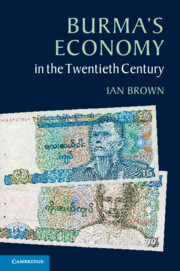Book contents
- Frontmatter
- Dedication
- Contents
- List of Illustrations
- List of Tables
- Note on names
- Acknowledgements
- Map of Burma/Myanmar
- Introduction
- 1 The economy at the beginning of the twentieth century
- 2 Strains in the late colonial economy
- 3 War and independence
- 4 In pursuit of socialism
- 5 Toward the market: the economy from 1988
- Conclusion: themes and threads
- Bibliography
- Index
- References
Introduction
Published online by Cambridge University Press: 05 June 2014
- Frontmatter
- Dedication
- Contents
- List of Illustrations
- List of Tables
- Note on names
- Acknowledgements
- Map of Burma/Myanmar
- Introduction
- 1 The economy at the beginning of the twentieth century
- 2 Strains in the late colonial economy
- 3 War and independence
- 4 In pursuit of socialism
- 5 Toward the market: the economy from 1988
- Conclusion: themes and threads
- Bibliography
- Index
- References
Summary
In 1987, Burma applied to the United Nations for classification as a Least Developed Country (LDC), a status that would make it eligible for relief on its international debt as well as eligible for additional financial assistance from UN agencies. The application was successful. But although clearly impoverished, Burma was in fact strikingly rich in natural resources, including teak, jade, rubies, oil and natural gas, lead, zinc, tin, but above all rice, cultivated in the vast, extremely fertile delta of the Irrawaddy River. Moreover, in the first decades of the twentieth century, Burma, if judged by the production and trade statistics, had been among the most prosperous territories in the East. Yet now, towards the close of the century, it was classified among the poorest nations in the world, grouped by the United Nations with, for example, Lesotho, Burkina Faso, and Rwanda. It was a humiliation.
It was not difficult to identify what, or rather who, was responsible for Burma's economic failure. Freed from British colonial rule in January 1948, Burma had had a parliamentary civilian government for the first decade and more of independence, save for a brief military caretaker administration at the end of the 1950s. But then on 2 March 1962, the military had seized power, and for the following quarter of a century had pursued an isolationist-nationalist, doctrinaire-socialist economic strategy – ‘infantile disorder’, in the later words of a group of Burmese economists – that eventually brought the country to ruin. The dominant political figure in this period was General Ne Win, autocratic and politically ruthless but also unpredictable and capricious, and who, it is said, sought the advice of astrologers on important government decisions.
- Type
- Chapter
- Information
- Burma's Economy in the Twentieth Century , pp. 1 - 5Publisher: Cambridge University PressPrint publication year: 2013



